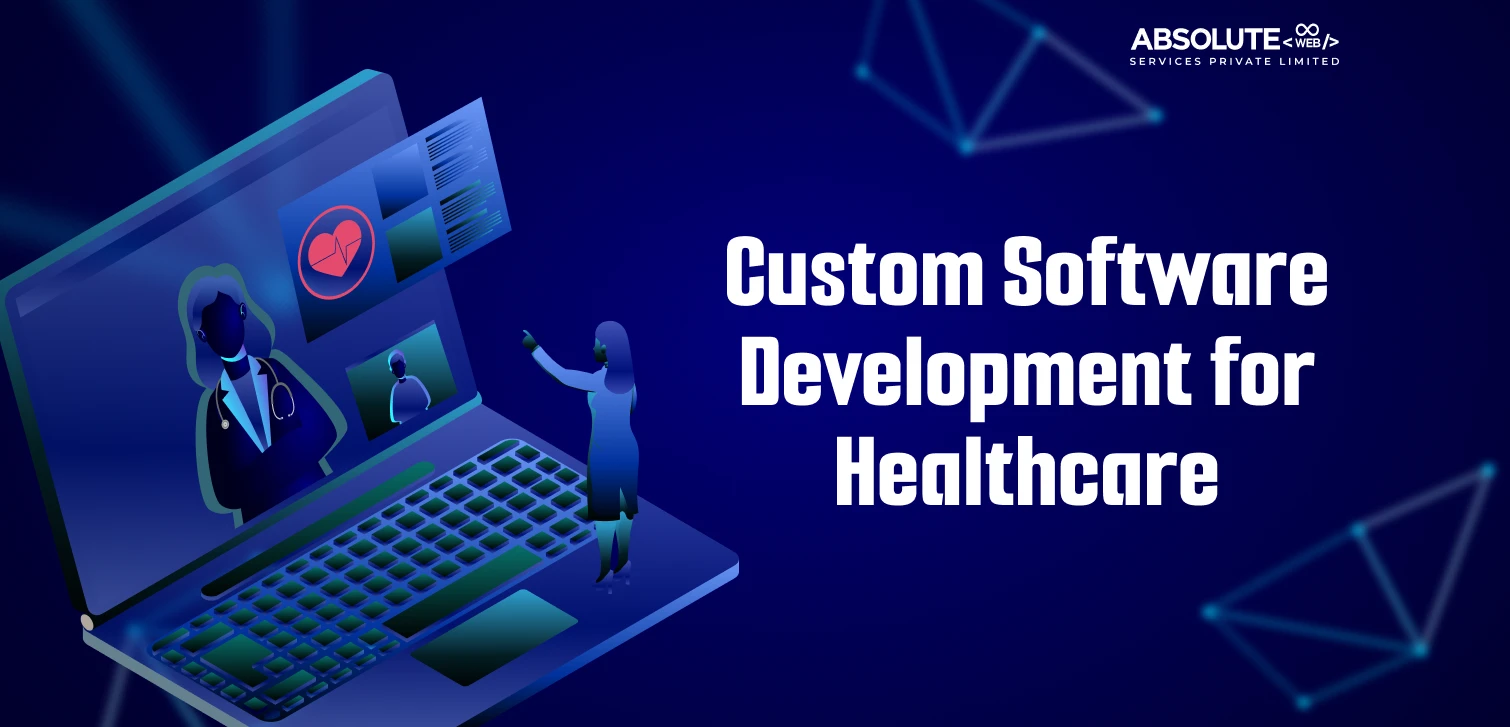Are You Being Slowed Down by Healthcare Issues?
Patient happiness, accuracy, and efficiency are not just goals in the healthcare industry; they are necessities. But many healthcare providers deal with issues including outdated technology, disjointed procedures, and rising costs. Have you ever experienced frustration when attempting to control many systems that aren’t able to communicate with each other? Or missed opportunities because your data is scattered across platforms? Custom Healthcare Software Development can streamline your systems, integrate your data, and optimize operations for better outcomes.
We have also been there. We at Absolute Web have direct experience with how these problems may waste time, money, and effort. More significantly, though, we have used customized software to assist corporations in overcoming these obstacles. We’re here today to discuss how custom software development may improve healthcare.
Why is custom software development necessary in the healthcare industry, and what exactly is it?
Custom software development is the process of creating, developing, and deploying software that is especially suited to the requirements of your company. Custom software solves the particular problems your healthcare team faces, in contrast to off-the-shelf options.
Why it matters for healthcare is as follows:
- Compliance & Regulations: The healthcare sector is subject to strict regulations, including GDPR in Europe and HIPAA in the United States. It’s possible that off-the-shelf software doesn’t entirely satisfy compliance criteria.
- Integration with Current Systems: Electronic health records (EHR), appointment scheduling, billing, and other functions are handled by a number of healthcare providers using a variety of systems. Workflows are streamlined by custom software that fills in the gaps between various systems.
- Scalability and Growth: Your needs will expand along with your practice. Off-the-shelf software frequently fails to meet your needs, but custom solutions may grow with you.
Data shows that technology is becoming more and more important in healthcare. Grand View Research’s 2022 report projects that the size of the global healthcare IT industry would increase at a compound annual growth rate (CAGR) of 20% between 2023 and 2030. One important factor in this rise is custom software.
How Is Patient Care Improved by Custom Software?
Let’s examine the most important component in more detail: enhancing patient care. Isn’t that the ultimate objective, after all?
- Minimizing Human Errors: Did you aware that over 250,000 deaths in the United States alone are caused by avoidable medical errors each year? A research that was published in the Journal of Patient Safety claims as much. Automating repetitive activities, minimizing human entry, and instantly identifying any problems are all possible with custom software. A personalized EHR system, for example, can notify physicians of medication interactions or missing patient information.
- Improving Patient Communication: Consider a patient-facing application that facilitates easy communication between medical professionals and patients. Patients are kept informed and involved by features like medication tracking, teleconsultations, and appointment reminders. At Absolute Web, we have created comparable technologies that have helped our clients increase patient satisfaction ratings by more than 30%.
- Simplifying Workflows: Administrative task bottlenecks are lessened via custom software. Simplified processes, such as automating insurance claims or linking test findings to patient records, allow medical staff to spend more time with patients and less time on paperwork.
Is Healthcare Cost-Effective with Custom Software?
Cost is one of the most frequent issues we hear. Let’s confront this directly.
Yes, there is an upfront cost associated with custom software. But when you consider the long-term return on investment, it’s revolutionary. According to a Deloitte study, operational expenses can be lowered by 10% to 15% when healthcare procedures are digitalized.
Custom software saves money in the following ways:
- Less Mistakes: Automation minimizes expensive errors.
- Increased Productivity: Employees can concentrate on important duties rather than debugging antiquated systems.
- Improved Resource Use: Custom software that incorporates predictive analytics aids in staffing and resource allocation optimization.
How Does Custom Healthcare Software Development Happen?
If you’re curious about the process, this is what Absolute Web usually does:
- Consultation and Discovery: We begin by learning about your needs. What is impeding your team’s progress? What do you envision? We collaborate closely with you to pinpoint problems and establish goals.
- Design and Prototyping: To see the solution, we then develop a roadmap and mockups. Before development starts, this stage makes sure that everyone is in agreement.
- Development and Testing: After our developers create the program, it is put through a rigorous testing process to guarantee security and dependability.
- Deployment and Training: After the program is prepared, we deploy it and give your team practical training. To guarantee a seamless adoption, this step is essential.
- Ongoing Maintenance and Support: We and healthcare don’t stop. When it comes to upgrades and troubleshooting, our support staff is always available.
What Qualities Should Custom Healthcare Software Have?
Although each healthcare provider has different requirements, several characteristics are always advantageous:
- EHR Integration: Verify that your product easily connects to your current EHR system.
- Telehealth Capabilities: Video consultations are a crucial element as telemedicine becomes popularity.
- Data analytics: Instruments for monitoring patient results, spotting patterns, and coming to informed conclusions.
- Security Features: For compliance, strong encryption, role-based access, and audit trails are essential.
- Mobile Accessibility: The software ought to be portable enough for both patients and clinicians to use while on the road.
What Dangers Come with Not Using Custom Software?
Let’s exchange the coins. What would happen if you continued to use antiquated systems?
- Patient Dissatisfaction: Bad encounters are caused by protracted wait times and inadequate communication. 59% of patients said they prefer providers who allow online appointment scheduling, according to Software Advice.
- Compliance Risks: Serious fines and reputational harm may arise from breaking data privacy rules.
- Operational Inefficiencies: Your team is slowed down by manual procedures and system silos, which has an impact on patient care and income.
True Narratives: Our Clients’ Transformations in Healthcare
We do more than merely talk the talk. Two instances of how we have walked the walk with our clients are as follows:
- Hospital Workflow Automation: To improve operational efficiency, a mid-sized hospital came to us. They were wasting time manually processing insurance claims. A 40% reduction in processing time brought about by the unique claims management system we created resulted in quicker payouts and more contented employees.
- Patient Engagement App: To increase patient retention, a private clinic implemented this app. We developed an app with functions including feedback surveys, confidential messaging, and appointment scheduling. Their patient satisfaction ratings rose by 25% in just six months.
Are You Prepared to Start?
Custom software development is about changing the way healthcare is provided, not just about technology. Building solutions that truly benefit both patients and providers is our passion at Absolute Web.
Let’s talk if you’re prepared to investigate how custom software can benefit your company. We are available to listen, offer advice, and produce outcomes that are specific to your need. Get in touch with us now, and together, let’s build a healthier future.



